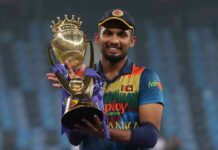On the day the International Cricket Council banned Pakistan spinner Saeed Ajmal from bowling calling his action illegal, World Cup winning former Sri Lanka skipper Arjuna Ranatunga made some interesting comments.
Ranatunga questioned why the ICC had waited so long to ban a bowler who had been occupying the number one slot for quite some time in the official ODI Rankings and urged the authorities to let the bowler perform until the end of the World Cup.
“With the World Cup less than six months away, it’s disappointing that the ICC is banning leading bowlers of some teams. These players should be allowed to play until the World Cup. The ICC should monitor them during the World Cup and then take a decision,” Ranatunga said.
“All of a sudden when your leading bowler is banned, it’s tough on the captain and selectors. They should have addressed the problem long before,” he added.
“The administrators need to address the issue of bowlers with suspect actions no doubt. I am just saying that the timing is not right. Ajmal has been playing international cricket for six years now and he’s world’s number one ranked bowler in ODIs. The issue should have been looked into much earlier,” Ranatunga added.
Ranatunga’s comments should not come as a surprise. One of the toughest battles he fought on and off the field was to protect offspinner Muttiah Muralitharan, who was no-balled for chucking during Sri Lanka’s tours of Australia in 1995 and 1998.
Ranatunga felt that the Australian umpires’ claim that Muralitharan chucked was wrong and went on to fight the offspinner’s case successfully with scientific evidence. Muralitharan played international cricket for 16 years after being called for chucking and retired as world’s highest wicket-taker in Test and ODI cricket. Ironically, he is Australia’s current spin bowling coach.
“We were excited about our tour of Australia in 1995,” Ranatunga reminisced speaking to gocricket.com. “We had won Test series in places like Pakistan and New Zealand in the lead-up to the tour of Australia. It was our first three-match Test series in Australia and we enjoyed that challenge. It was a huge honour playing the Boxing Day Test at MCG. I was stunned when umpire Darrel Hair no-balled Muralitharan in front of some 50,000 spectators.”
“I was fielding at mid-on. When he was first no-balled I thought it was for overstepping. But he did it for a couple of times and I was watching the crease and there was no issue with overstepping. So I walked up to umpire Hair and said what’s wrong and his response made me realize my worst fears,” Ranatunga said.
Hair no-balled Muralitharan seven times. Ranatunga took him away from Hair’s end and brought him back from the end where New Zealander Steve Dunne was standing and the game continued without much drama. But the damage had been done.
There was a cloud over Muralitharan’s action throughout the tour and he was no-balled again during the tri-nation series that followed also involving England.
“The chucking incident was terrible thing to go through. Murali was a young lad and it was tough on him. He even wanted to remodel his action and was looking at the option of bowling legspin. In hindsight, one good thing that happened after the chucking controversy was that it made us strong and brought the team together. Everyone was behind Murali and that sort of team atmosphere was tailor-made ahead of the World Cup,” Ranatunga revealed.
“I remember we went back home after the tour and there was a selection committee meeting to pick the World Cup squad. I was called for the meeting and the selectors were reluctant to pick Murali as they feared that he might be called again and we will have to play the whole tournament without a player. But I insisted on Murali being there and eventually the selectors agreed,” Ranatunga further said.
Muralitharan played a key role as Sri Lanka went on to win their maiden World Cup title. It was a sweet moment for the Sri Lankans as the victory in the final came against Australia. Three years later, the Sri Lankans toured Australia again. Muralitharan was a targeted man in 1999 as well. As expected, umpire Ross Emerson no-balled him in an ODI in Adelaide. The Sri Lankans, however, were well prepared this time.
Ranatunga took the team to the edge of the boundary and threatened to abandon the tour as the ICC had cleared Muralitharan’s action after extensive tests. The Australian cricket board officials and match referee Peter van der Merve had to intervene and the Sri Lankans got back into the field after some assurance from their hosts. Play had been held up for 12 minutes.
There were no incidents after that on the field, but Ranatunga became a targeted man. The ICC fined him 75 percent of his match fee and was handed a suspended sentence of six ODIs. Roy Dias, who coached the side during the tour, remembered the incident. “Ultimately things turned out in such a way that there was nothing to do with Murali, but it was Arjuna’s baby after he pointed the finger at the umpire. Murali’s issue ultimately became a case against Arjuna,” Dias recalled.
“Arjuna went through a lot of hardships. There were official functions and he couldn’t come on time for those functions. He was late and he used to have a quick bite and get back because the lawyers were waiting for him. He went through hell in Australia. Arjuna, you know, is a bubbly character, but on that tour, you could see the toll it was taking on him,” Dias further said.























